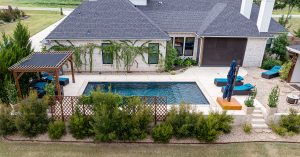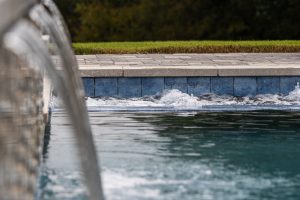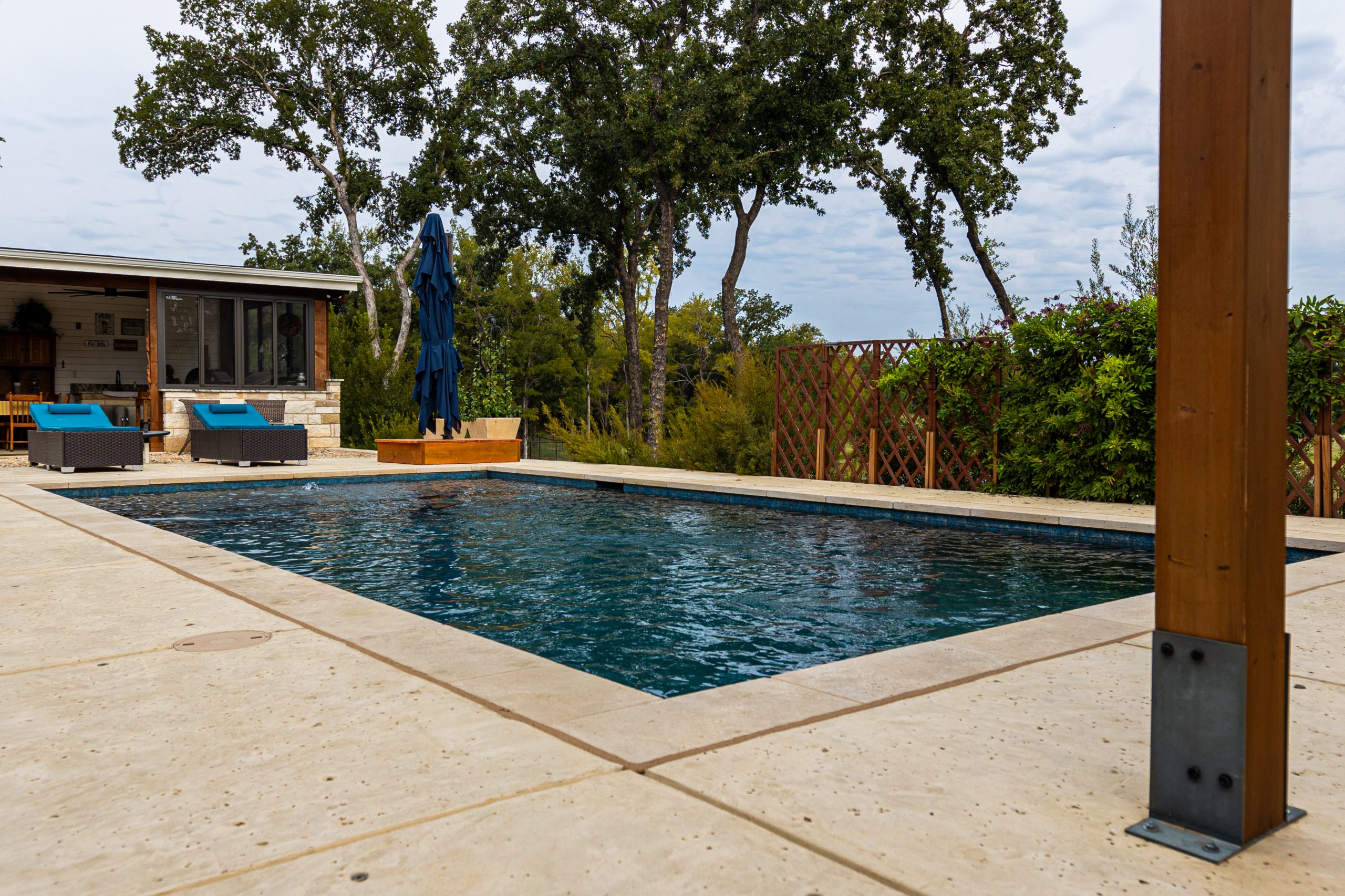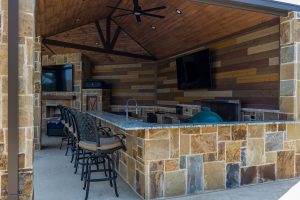Sustainable Luxury
The concept of luxury has evolved significantly in recent years. Today’s discerning homeowners increasingly seek amenities that not only provide exceptional experiences but also align with environmental values. Nowhere is this shift more evident than in the world of high-end swimming pools, where sustainability has become a defining characteristic of truly forward-thinking designs. At Strand Luxury Pools, we’ve embraced this evolution, developing innovative approaches that deliver uncompromising luxury while significantly reducing environmental impact.
The New Definition of Luxury: Responsible Indulgence
Modern luxury isn’t just about opulence—it’s about thoughtful design that minimizes waste and maximizes efficiency without sacrificing the premium experience. For pool owners, this means installations that conserve water and energy while maintaining the aesthetic appeal and functionality expected in high-end properties.
The most sophisticated clients now recognize that sustainability and luxury are complementary rather than contradictory. A pool that incorporates cutting-edge eco-friendly technologies demonstrates not only environmental consciousness but also a commitment to innovation and long-term thinking—qualities that resonate strongly in luxury markets.
Energy-Efficient Systems: The Foundation of Sustainable Pool Design
The most significant environmental impact of traditional pools typically comes from energy consumption. Modern sustainable pools address this through several key innovations:
Variable-Speed Pump Technology
The heart of any pool system is its circulation pump. Traditional single-speed pumps operate at full power regardless of actual needs, consuming excessive electricity. Variable-speed pumps represent a revolutionary improvement:
- They adjust their output based on current requirements, operating at lower speeds for routine circulation
- Energy savings typically range from 50-90% compared to traditional pumps
- Though more expensive initially, they usually pay for themselves within 1-2 years through reduced utility costs
- They operate more quietly, enhancing the tranquil pool environment

Intelligent Heating Solutions
Heating represents another major energy consideration for luxury pools. Sustainable approaches include:
Solar Heating Integration
Solar heating systems have evolved dramatically from the basic black mats of previous decades. Today’s options include:
- Sleek, low-profile solar panels that can be integrated into landscaping or existing structures
- Hybrid systems that combine solar with traditional heating for consistent performance regardless of weather
- Smart controllers that maximize solar collection and optimize heat distribution
High-Efficiency Heat Pumps
For situations where solar isn’t sufficient, modern heat pumps offer remarkable efficiency:
- They extract heat from the surrounding air rather than generating it directly
- They typically deliver 5-6 units of heat energy for each unit of electricity consumed
- Smart models adjust operation based on weather forecasts and usage patterns
LED Lighting Systems
Lighting creates the ambiance that defines luxury pool environments. LED technology delivers both sustainability and enhanced aesthetic options:
- They consume up to 80% less electricity than traditional pool lighting
- They last 5-10 times longer, reducing replacement frequency
- They offer programmable color options and effects impossible with conventional lighting
- They generate less heat, improving overall system efficiency
Water Conservation: Luxury Without Waste
Water conservation represents another critical aspect of sustainable pool design, addressing both environmental concerns and increasingly stringent regulations in many regions:
Advanced Filtration Systems
Modern filtration approaches dramatically reduce water waste while improving water quality:
Regenerative Media Filters
These advanced systems use significantly less water than traditional sand or DE filters:
- They require up to 90% less water for backwashing
- They filter to finer particulate levels, improving water clarity
- They reduce chemical requirements through superior filtration
Ozone and UV Sanitization
Complementing traditional chemical treatments, these technologies:
- Reduce chemical usage by 60-90%
- Improve water quality and swimmer comfort
- Extend the life of pool finishes and equipment by reducing chemical exposure

Automated Cover Systems
Perhaps the single most effective water conservation measure is a quality automated cover:
- They reduce evaporation by up to 95% when closed
- They minimize heat loss, reducing heating energy requirements
- They reduce chemical consumption by preventing UV degradation
- They improve safety, providing peace of mind for families
Rainwater Harvesting Integration
Truly comprehensive sustainable designs incorporate rainwater collection systems:
- Captured rainwater can be filtered and used to replace evaporated pool water
- System integration with home rainwater collection provides economies of scale
- Some jurisdictions offer incentives for rainwater harvesting installations
Sustainable Materials: Beauty With Responsibility
The materials used in pool construction significantly impact both environmental footprint and long-term sustainability:
Durable Pool Finishes
Selecting the right interior finish extends renovation intervals and reduces lifetime resource consumption:
- Pebble-based finishes typically last 15-20 years, compared to 7-10 years for traditional plaster
- Glass tile, while initially more expensive, can last the lifetime of the pool with minimal maintenance
- Quartz-enhanced finishes offer improved durability with reduced maintenance requirements
Deck and Coping Materials
The pool surround presents numerous opportunities for sustainable choices:
- Permeable deck materials allow rainwater to recharge groundwater rather than contributing to runoff
- Locally-sourced stone reduces transportation impacts
- Composite decking made from recycled materials offers durability without harvesting new resources
- Light-colored materials reduce heat island effects and pool heating requirements
Smart Technology: The Efficiency Multiplier
Intelligent control systems tie these sustainable elements together, optimizing performance and further reducing resource consumption:
Automated Chemical Management
Smart chemical controllers maintain perfect water balance with minimal chemical usage:
- They continuously monitor water chemistry, making micro-adjustments as needed
- They prevent the over-correction cycles common with manual management
- They extend equipment life by preventing corrosive or scaling conditions
Weather-Responsive Automation
Advanced systems incorporate weather data to optimize operations:
- They can reduce heating in advance of warm weather
- They can adjust chemical dosing based on anticipated sun exposure
- They can modify filtration schedules based on usage patterns and environmental conditions
Remote Monitoring and Management
Cloud-connected systems allow for continuous optimization:
- They provide real-time alerts about system performance
- They enable remote adjustments without site visits
- They track resource consumption, identifying opportunities for further efficiency
The Economic Case for Sustainable Luxury Pools
Beyond environmental benefits, sustainable pool design delivers compelling economic advantages:
Reduced Operating Costs
The cumulative effect of efficiency measures significantly reduces ongoing expenses:
- Energy savings typically range from 50-75% compared to traditional designs
- Water consumption can be reduced by 30-50%
- Chemical usage often decreases by 40-60%
Extended System Longevity
Properly designed sustainable systems typically last longer:
- Reduced chemical usage extends the life of pool finishes and equipment
- Variable-speed pumps typically last 2-3 times longer than single-speed models
- Smart systems prevent damaging operating conditions
Enhanced Property Value
As sustainability becomes increasingly important to luxury buyers, eco-friendly pools offer market advantages:
- They appeal to environmentally conscious buyers in premium markets
- They demonstrate forward-thinking design and attention to detail
- They offer protection against increasing utility costs and water restrictions
The Strand Luxury Pools Approach to Sustainable Design
At Strand Luxury Pools, we believe that true luxury includes responsibility—to our clients, to the environment, and to future generations. Our sustainable design approach integrates these principles from the earliest concept discussions:
- We begin with a comprehensive site analysis to identify opportunities for natural integration and resource efficiency
- We develop customized sustainability strategies based on client priorities, local conditions, and regulatory requirements
- We select technologies and materials that balance immediate luxury with long-term performance
- We implement sophisticated control systems that maximize efficiency while maintaining simplicity of operation
- We provide ongoing support to ensure systems continue to perform optimally throughout their lifespan
The result is a pool that delivers an exceptional experience while minimizing environmental impact—true sustainable luxury that enhances both the property and the planet.
Conclusion: The Future of Luxury Pool Ownership
The evolution toward sustainable luxury represents not a trend but a fundamental shift in how we define premium experiences. Tomorrow’s most coveted pools will be those that deliver extraordinary enjoyment while demonstrating environmental responsibility—a combination that reflects the values of discerning homeowners.
By embracing these principles today, Strand Luxury Pools clients position themselves at the forefront of this evolution, enjoying pools that are not only stunning and enjoyable but also aligned with the growing emphasis on sustainability in luxury markets.
Whether you’re planning a new installation or considering upgrading an existing pool, we invite you to explore how sustainable design can enhance your luxury pool experience—creating an oasis that’s as responsible as it is remarkable.



